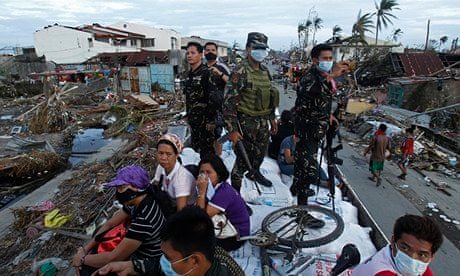As a Filipino-American, I have reeled in shock and helplessness as thousands of Filipinos in Typhoon Haiyan-decimated Tacloban City were shown every day sitting, wandering, crying, with nowhere to go, without food, water, shelter, and medical attention. After six days and reports of no aid arriving yet, I wrote 17 friends in Manila seeking answers as to why more aid had not reached those devastated by this natural disaster. They felt the same despair I did, often telling me: "not enough aid reached the people in a timely manner".
Like many others, I am thankful for the generosity of my fellow Americans, many of whom have already donated millions to the relief effort. But I could never have imagined that red-tape and outdated rules written by the US Congress in the 1950s could delay urgently needed relief from reaching the millions of people who desperately need humanitarian assistance in my native land.
These regulations require the vast majority of US food aid to be shipped from preferred growers in the US on preferred US ships. Food has to be shipped more than 11,000 nautical miles across the ocean, even though there is ample food available much closer to the crisis, in unaffected areas of the Philippines and in countries like Thailand and Vietnam – at a lower price for taxpayers. The rules prevent aid agencies like the World Food Program from purchasing food from the closest and most cost-effective sellers. Delays in delivering food because of red tape doesn't just cost tax dollars, it can cost lives.
It is unconscionable that red tape is delaying food from reaching people whose lives have already been destroyed by Haiyan. Since I started a petition to exempt Typhoon relief from outdated regulations, tens of thousands of Americans signed on to let the US Congress know they care about the issue. Their message is loud and clear: fix the broken food aid system. Haiyan is a perfect example of why reform is so desperately needed, both now and for future disasters.
It is now more than a month since super-typhoon Haiyan devastated the central region of the Visayas in the Philippines. We now know that 14 million were impacted, 4 million were displaced and are without homes. The Philippine government said weeks ago that they were feeding 1.4 million people a day, and the government is being blamed for not doing more. Yet as the WHO Director of Emergency Risk Management and Humanitarian Response said on NPR:
the complexity of the disaster is not only its magnitude, but the enormous geographic spread of the impact of the cyclone over 600 km or a 400 mile swath over different islands.
The logistics of aiding disaster survivors in the Philippines are further complicated by the fact that it is made up of 7,107 islands.
The reality on the ground in such disasters is so complex that it is indefensible for US food aid regulations to hinder our humanitarian response simply to enforce antiquated rules. We could start reaching more people at no extra cost to taxpayers almost immediately, because Congress has the power to waive these regulations. Please join me and thousands of others in calling on Congress to save lives now by exempting the emergency response from FDA food regulations, so humanitarian aid can reach suffering people when they need it most.
It has been said that 90% of all giving happens within 90 days of an event. When 8 February 2014 comes around, the world may have forgotten how hard super-typhoon Haiyan hit the Philippines. But if we achieve this small change in policy, we can be proud of helping to empower the Philippines to walk strong on the long road to recovery and rebuilding.
